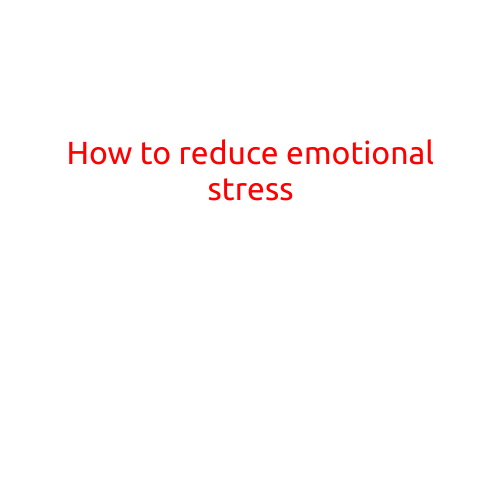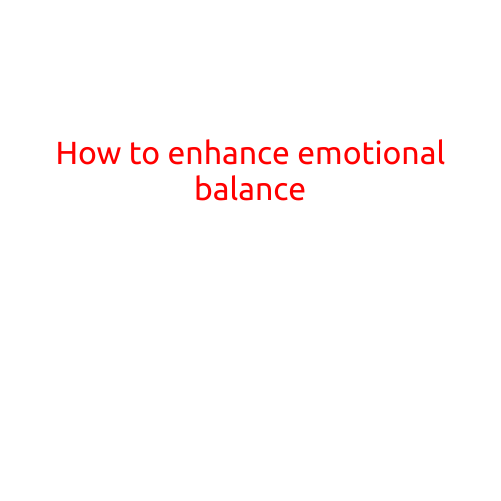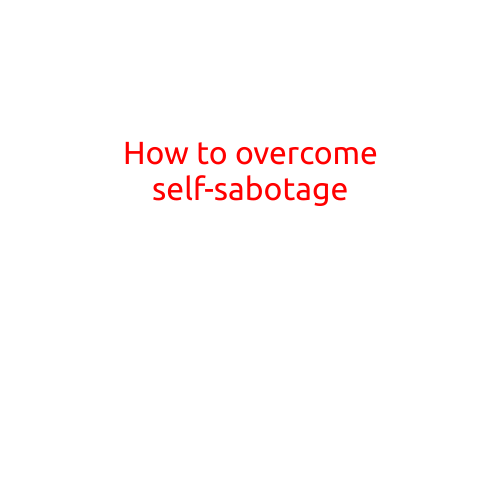
How to Reduce Emotional Stress
Are you feeling overwhelmed, anxious, and exhausted from the emotional demands of daily life? You’re not alone. Emotional stress is a common experience that can affect anyone, regardless of age, profession, or background. However, there is hope. By learning effective strategies to manage emotional stress, you can improve your overall well-being and live a happier, healthier life.
What is Emotional Stress?
Emotional stress, also known as emotional exhaustion, is a state of feeling mentally, emotionally, and physically drained due to prolonged periods of stress, anxiety, or overwhelm. It can be caused by a variety of factors, including work-related demands, personal relationships, financial pressures, and social media exposure.
** Signs of Emotional Stress**
Look out for these common signs of emotional stress:
- Feeling exhausted or irritable
- Difficulty sleeping or concentrating
- Increased anxiety or restlessness
- Mood swings or irritability
- Physical symptoms like headaches, muscle tension, or digestive issues
10 Effective Ways to Reduce Emotional Stress
Fortunately, there are many ways to reduce emotional stress and improve your overall well-being. Here are 10 effective strategies to try:
- Practice Deep Breathing Exercises
Take slow, deep breaths in through your nose and out through your mouth. This simple technique can help calm your mind and body.
- Exercise Regularly
Engage in physical activity that you enjoy, such as walking, yoga, or dancing. Exercise can help reduce stress and anxiety while improving mood.
- Set Boundaries
Learn to say “no” to commitments that drain your energy. Set healthy boundaries with others to protect your time and emotional well-being.
- Practice Mindfulness Meditation
Focus on the present moment, without judgment. Mindfulness meditation can help reduce stress and increase feelings of calm and clarity.
- Get Enough Sleep
Aim for 7-9 hours of sleep each night to help your body and mind recover from the stresses of the day.
- Connect with Nature
Spend time outdoors, whether it’s walking in a park or simply gazing out a window. Nature can help reduce stress and improve mood.
- Engage in Hobbies
Make time for activities that bring you joy and relaxation, such as reading, painting, or playing music.
- Take Breaks
Take short breaks throughout the day to stretch, move your body, and clear your mind.
- Practice Gratitude
Reflect on the things you’re thankful for each day, no matter how small they may seem. Focusing on gratitude can help shift your perspective and reduce stress.
- Seek Social Support
Connect with loved ones, friends, or a therapist who can offer emotional support and guidance.
Conclusion
Reducing emotional stress doesn’t have to be overwhelming. By incorporating these 10 effective strategies into your daily routine, you can manage stress, improve your mental and physical health, and live a happier, healthier life.
Remember, taking care of your emotional well-being is just as important as taking care of your physical health. By prioritizing your emotional well-being, you’ll be better equipped to handle the stresses of life and thrive in the process.
Start reducing emotional stress today and discover a more balanced, peaceful you.





